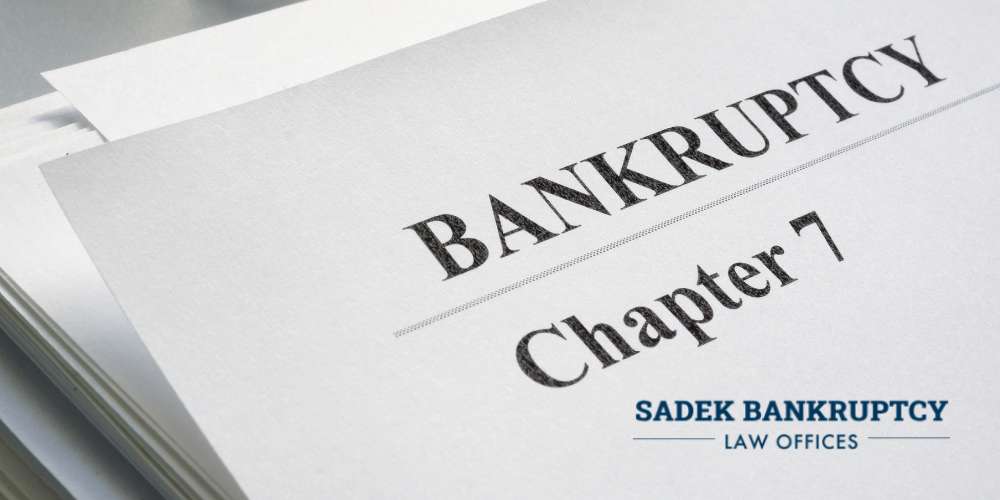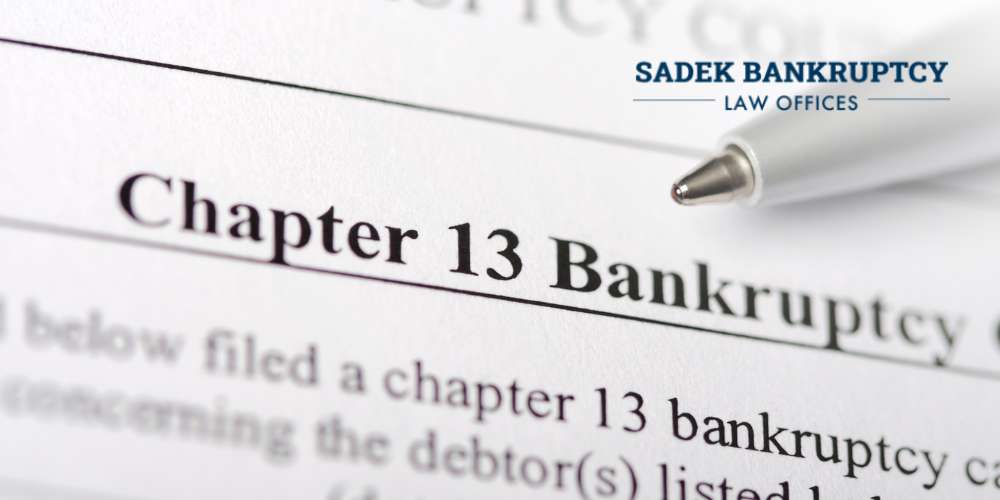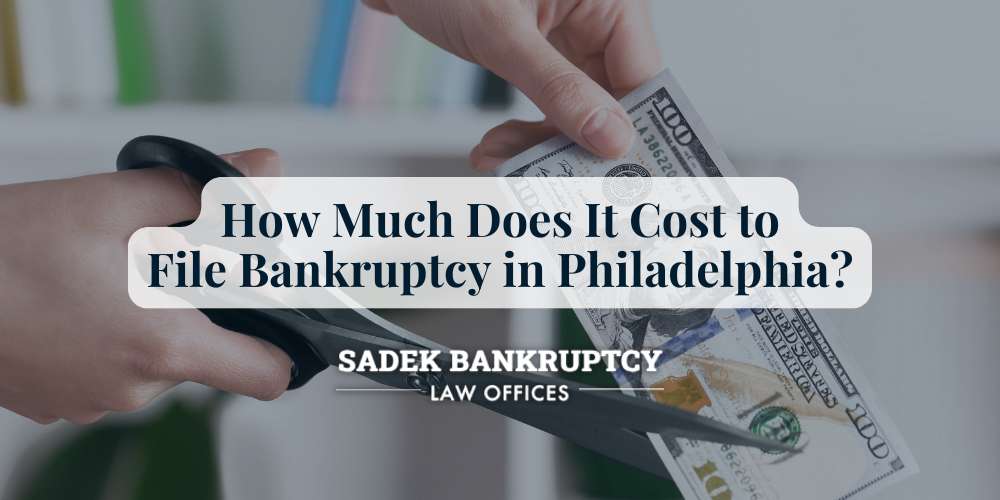As a bankruptcy lawyer in Philadelphia, Pennsylvania, I understand that legal fees and costs are of great concern to our potential clients. The most common question I get from clients and, sometimes, from other lawyers, is, “How much does it cost to file bankruptcy in Philadelphia?”
This answer does depend on the Chapter of Bankruptcy, whether a Chapter 7 or Chapter 13, and the complexity of the matter as well. But generally, legal fees and costs prior to filing are around $2,000. I have some clients that are financially prepared to file right away. However, most of our clients require flexibility when it comes to legal fees.
At Sadek Bankruptcy Law Offices, we do all that we can to assure that our clients are taken care of and that their financial burdens are lifted to the best of our ability. If you find yourself in need of bankruptcy assistance and you’re not sure of the cost, we’re here to help! Schedule your free consultation with our Philadelphia bankruptcy attorneys today by calling (215) 545-0008.
How Much Is It to File Bankruptcy?
The cost of a bankruptcy filing varies depending on the type of bankruptcy you choose. For Chapter 7 bankruptcy in PA, the court filing fee is approximately $338, but additional costs, such as credit counseling and attorney fees, can bring the total to $2,500 and up.
Chapter 13 bankruptcy in Pennsylvania typically has a higher cost due to its complexity, with a court filing fee of $313 and total expenses, including attorney fees, brings the total to $5,000 and up. The exact cost depends on the specifics of your case, making it essential to consult an experienced bankruptcy attorney to fully understand the financial commitment.
What Factors Affect the Cost of Filing Bankruptcy?
When considering a bankruptcy cost, several factors influence the total amount you may pay. The most significant factors include the type of bankruptcy chapter you file under, the administrative and court filing fees required, and the legal and attorney fees involved. Each of these elements plays a role in determining your overall expenses and varies based on the complexity of your case, your income, and other personal circumstances.
Bankruptcy Chapter
The bankruptcy process you choose, whether Chapter 7 or Chapter 13, has a significant impact on the overall cost. Chapter 7 is often less expensive because it involves liquidating non-exempt assets to repay creditors, typically completed in a few months. Chapter 13, however, requires creating a repayment plan over three to five years, making it more complex and time-intensive. This complexity often results in higher attorney and administrative fees.
Administrative and Court Filing Fees
The bankruptcy filing fees associated with a case include charges for administrative costs and court processing. In Chapter 7, the filing fee is approximately $338, while Chapter 13 requires a filing fee of around $313. However, individuals experiencing financial hardship may request a fee waiver through the bankruptcy courts.
Additional expenses include mandatory sessions with a nonprofit credit counseling agency and completing a debtor education course, which can add up to $50–$100. The court will also assign a bankruptcy trustee to your case, and they may require additional administrative fees depending on the complexity of your bankruptcy.
Legal and Attorney Fees
The skill of a bankruptcy attorney is critical in navigating the process, and attorney fees vary based on the type of bankruptcy filed. For Chapter 7 cases, the presumptively reasonable attorney fee typically ranges between $1,000 and $2,500, depending on the complexity of the case.
For Chapter 13 filings, attorney fees are higher, often ranging from $3,000 to $6,000, as these cases involve creating and managing a repayment plan over several years. An experienced Chapter 13 bankruptcy attorney can manage your case from start to finish, and can handle your case with the care and precision it deserves.
Types of Bankruptcy and Their Costs
When exploring the types of bankruptcy and their costs, it’s important to understand the differences between Chapter 7 bankruptcy and Chapter 13 bankruptcy. Chapter 7 is typically the more affordable option, designed for individuals with limited income who need a fresh start by liquidating non-exempt assets.
Chapter 13, on the other hand, allows individuals to restructure their debts through a repayment plan, making it a more complex and often costlier process. Consulting a knowledgeable bankruptcy law firm can help you determine the best option for your financial situation and provide clarity on the associated costs. In the following sections, we outline the costs associated with each type of bankruptcy in PA.

Chapter 7 Bankruptcy
Chapter 7 bankruptcy is designed to help individuals eliminate overwhelming debt by liquidating non-exempt assets to pay creditors. It is often used by those with significant unsecured debt, such as credit card balances, medical bills, or personal loans. In most cases, individuals can retain essential property, such as a primary home or car, while discharging debts that cannot be repaid. Chapter 7 provides a fresh financial start for those who qualify, typically completing the process within a few months.
How Much Does It Cost to File Chapter 7 in Philadelphia?
Filing a Chapter 7 bankruptcy case typically involves a court filing fee of $338, which is paid to the local bankruptcy court. Additional costs may include credit counseling and debtor education courses, which typically range from $50 to $100.
Chapter 7 Filing Fee Installments
Chapter 7 bankruptcy filers who cannot pay their filing fees upfront may request to make installment payments to the court. This option allows individuals to break the $338 fee into smaller, more manageable payments over a set period, typically within four installments.
How Much Does a Lawyer Charge for Chapter 7 in Philadelphia?
Attorney fees for a Chapter 7 case generally range from $1,000 to $2,500, depending on the complexity of your financial situation and the experience of the attorney you choose.
How Much Do You Have to Be in Debt to File Chapter 7 in Philadelphia?
There is no specific minimum debt required for a bankruptcy filing under Chapter 7. Instead, eligibility is determined by your financial situation, including your income, expenses, and the type of debt you owe. If your debts are overwhelming and you cannot afford to repay them, Chapter 7 may be an option to help you achieve financial relief.

Chapter 13 Bankruptcy
Chapter 13 bankruptcy allows individuals to create a structured repayment plan to pay back creditors over three to five years. Unlike Chapter 7, this type of bankruptcy does not involve liquidating assets, making it an appealing option for those with a steady income who want to keep their property. Chapter 13 is often used to let individuals catch up on missed mortgage or car payments, reorganize debts, and manage obligations more effectively while staying under the protection of the court.
How Much Does It Cost to File Chapter 13 in Philadelphia?
Filing a Chapter 13 bankruptcy involves a court filing fee of $313, which is paid to the court. Additional costs include credit counseling and debtor education courses, which typically range from $50–$100.
How Much Does a Lawyer Charge for Chapter 13 in Philadelphia?
Attorney fees for Chapter 13 are higher than those for Chapter 7 due to the complexity of creating a repayment plan. The cost of a Chapter 13 filing often ranges from $3,000 to $6,000. An experienced bankruptcy lawyer can handle your case correctly and efficiently, increasing your chances of a successful outcome.
How Much Do You Have to Be in Debt to File Chapter 13 in Philadelphia?
Bankruptcy courts do not require a minimum amount of debt to file for Chapter 13 bankruptcy; however, there are limits on how much debt you can have. As of 2025, individuals must have less than $1,395,875 in secured debts and less than $465,275 in unsecured debts to qualify.
$0 Down Bankruptcy Options in Philadelphia
As the #1 filer of bankruptcies in the greater Philadelphia area, we can be most flexible when it comes to legal fees and payment plans. Our office offers Chapter 7 legal fees for as low as $0.00 down. This means that a filer only pays the Court filing fee $338.00, plus a credit counseling course ($20.00) and a credit reporting fee ($45.00), totalling $403.00. Then, they pay the legal fees through an extended monthly payment plan over the course of one year through a third party.
Of course, filing in this fashion somewhat complicates the case, and there are third-party fees as well, which significantly increase the overall case cost. However, “$0.00” down is an effective way to file bankruptcy quickly in Philadelphia if one does not have the financial ability to satisfy legal fees and costs prior to filing.
Payment Plan Prior to Filing Bankruptcy
Our Philadelphia bankruptcy law office also offers payment plans prior to filing. Extended payment plans for legal services, such as bankruptcy and related areas of law in Philadelphia, have been the hallmark of our practice since 2006. Our office generally allows 6 months for a client to pay toward their legal fees.
Once a client contacts our office, they do not want to wait another 6 months to file. However, we are more than happy to offer an extended payment plan if life’s financial emergencies do happen. Also, by offering an extended payment plan, we are allowing our clients to start saving money, and savings is the key to staying out of debt.
Further, during the extended payment plan, we will field all creditor communication on behalf of our bankruptcy client. We advise that our clients forward to us any creditor communication. They should answer the phone and say, “I have hired a lawyer regarding this debt. Please call my lawyer, Brad Sadek of Sadek Bankruptcy Law Offices, and he will field any questions you have.” Our office fields creditor calls 24 hours a day, 7 days a week, to ease the emotional burden of debt our clients were carrying.
How Much Does It Cost to Not File Bankruptcy?
Chapter 7 Bankruptcy Example
This answer depends greatly, but let’s use the example of an individual client who qualified for a Chapter 7 Bankruptcy and had $30,000 in debt. They had minimum payments of $900 per month to their creditors. In this example, the debt cost $10,800 per year, and over 5 years of minimum payments, the debt would cost $54,000. With only minimum payments of $900, this would be far from paid off.
By filing Chapter 7 Bankruptcy and eliminating the debt, the bankruptcy filer has saved $52,000 ($54,000 – $2,000 legal fee) over a 5-year period. Further, the bankruptcy will help improve the filer’s credit score, so long as they stay away from new debt. The bankruptcy will also provide greater ability to save for life’s emergencies, rather than relying on the debt cycle. Lastly, bankruptcy allows greater financial freedom to finance life’s rewards such as a new car or a new home.
Chapter 13 Bankruptcy Example
The idea to revisit the topic of the cost to file/not file bankruptcy is from the following situation. I believe as we heal from the pandemic, and as mortgage forbearances come due, this will be increasingly common in the Philadelphia area. Our Chapter 13 bankruptcy client was laid off during the pandemic and was provided a mortgage forbearance for one year. My client is also 11 years into a 30-year mortgage term.
The one year of mortgage payments at $1,500.00 amounted to $18,000.00 with taxes and insurance included. My client made numerous calls and wrote hundreds of emails to the mortgagee that went unanswered or received a canned message at best. My client was also using personal loans to pay for life’s necessities in that he has a wife and 2 kids and is/was the breadwinner for the family. The personal loans amount to $20,000.00.
My client was one of the lucky few who eventually heard back from the mortgage company. However, he expected the mortgagee to add his $18,000 of forborne mortgage payments to the “back-end” of the mortgage. The mortgagee’s response was a proposed modified mortgage over a new 30-year term with a new mortgage payment of $1,400.00 per month. Or, he could pay the $18,000 in a lump sum, which was not financially feasible for him.
At my client’s current mortgage, he has 19 years left at $1,500.00 a month or $342,000.00, plus the $18,000.00 that he is behind, for a total amount due of $360,000.00.
At the proposed modified mortgage amount, at a new 30-year term (adding 11 years to the mortgage) at $1,400.00 a month, the mortgage would cost $504,000.00 over 30 years.
My client’s solution was to file a Chapter 13 bankruptcy and repay the $18,000.00 of mortgage arrears over a 5-year period while paying 0% to the $20,000 of personal loan debt. My client is now working, paying his regular monthly mortgage of $1,500.00 and a Chapter 13 Trustee payment of $370.00 per month, and saving $144,000.00 by not accepting the modification and $20,000.00 that was due on the personal loans for a total savings of $164,000.00.
Bankruptcy Cost FAQs
What Is the Cheapest Way to File Bankruptcies in Philadelphia?
The cheapest way to handle a bankruptcy filing is by pursuing Chapter 7, if you qualify, as it typically has a lower bankruptcy cost compared to Chapter 13. This includes a court filing fee of $338 and potentially qualifying for a fee waiver or using installment payments if you cannot pay upfront. While it is possible to file without an attorney, a qualified bankruptcy attorney can correctly manage your case, which can save you from costly mistakes in the long run.
Is It Cheaper to File Chapter 7 or Chapter 13?
Filing for Chapter 7 generally has a lower bankruptcy cost compared to Chapter 13. The court filing fees for Chapter 7 are approximately $338, while Chapter 13 fees are $313. However, attorney fees for Chapter 13 are usually higher due to the complexity of managing a repayment plan over several years. For those with limited income and simple cases, Chapter 7 is often the more affordable option.
Can You File Bankruptcy Chapter 7 Online?
Yes, it is possible to file for bankruptcy under Chapter 7 online through the federal court system’s electronic filing portal. However, this option is typically available only to attorneys and approved filers. This is because the process requires detailed legal knowledge and strict adherence to court rules.
Can You File Bankruptcy Chapter 13 Online?
Yes, you can file for bankruptcy under Chapter 13 online using the federal court system’s electronic filing system. However, this process is primarily designed for attorneys and experienced filers, as Chapter 13 cases require filers to create detailed repayment plans that meet specific legal requirements.
Contact Sadek Bankruptcy Law Offices for Bankruptcy Solutions in Philadelphia
In summary, yes, there is a cost to filing bankruptcy. However, I believe the savings potential in bankruptcy makes it the most powerful tool in all of law. Learn more about how bankruptcy can help you save money today. Call our Philadelphia bankruptcy office 24/7 at (215) 545-0008. We look forward to helping you!





